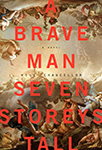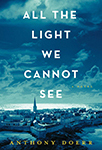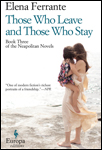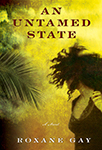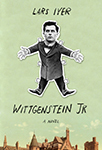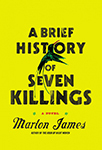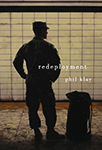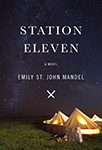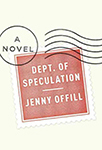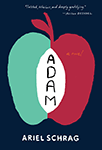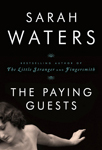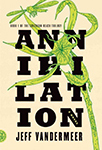by Jesse Ball
30% OFF at Powell’s »Stephin Merritt: Roxane Gay’s An Untamed State and Anthony Doerr’s All the Light We Cannot See are humorless novels about characters ravaged by political forces over which they have no control. Each author finds it necessary to describe a gang rape at length.
Gay’s kidnapped protagonist is brutalized endlessly by her captors:
I pulled on my clothes. My body was not my body; it was less than nothing. I followed TiPierre back to the bathroom. Everything sounded muffled. The taste of blood and men filled my mouth, ran between my teeth. My feet were bare. Something gritty collected between my toes. When TiPierre looked away, I started running toward where I thought the front door was. Hobbled as I was, I did not get far. TiPierre grabbed me by my shoulders. He said, “Be smart,” and steered me to the bathroom holding me by my hair. The mirror in the bathroom was still shattered and what remained was still stained with my blood. I did not bother to look at myself.
Doerr describes a German orphanage at the mercy of Russian soldiers:
One is an officer. Two cannot be a day older than seventeen. All are filthy beyond comprehension, but somewhere in the previous hours, they have taken the liberty of splashing themselves with women’s perfume. The two boys, in particular, smell toxically of it. They seem partly like sheepish schoolboys and partly like lunatics with an hour left to live. The first has only a rope for a belt and is so thin, he does not have to unknot it to slide off his trousers. The second laughs: a strange, puzzled laugh, as if he does not quite believe the Germans would come to his country and leave a city like this behind. The officer sits by the door with his legs straight out in front of him and peers out into the street. Hannah screams for a half second but quickly muffles it with her own hand.
It is not clear to me who Gay’s intended readership is. So ugly and revolting is the Haiti she describes, that her book could have been financed by the tourism council of a rival destination. The protagonist, Mireille, is an entitled lawyer from a wealthy Haitian family, arrogant and unlovable, with a puzzling habit of running away so that her fiancé has to go in search of her. For no reason. Her complete absence of introspection only increases throughout the novel as she is kidnapped, raped, and tortured for 12 days, leaving her mangled and insane. Then, because she is insane, she runs away some more. The point of all this eludes me, unless it is to emphasize—yes, to really emphasize, because it is undoubtedly worth emphasizing—that no matter how much of a jerk someone is, they don’t deserve to be kidnapped, raped, and tortured. But I think we knew that.
An overdependence on thudding anaphora creates a drearily repetitive quality to Gay’s prose which gets increasingly tedious, as with this paragraph of seven sentences beginning with “She”:
She shooed the men away and closed the door so we were alone. She knelt next to me, and pulled my arms down from over my face. She said, “There now,” as she carefully pried my fingers loose from the wire cutters. She held my hands gently. She told me my name and that I had a husband and son waiting for me. She told me I was safe and I was loved. She said these things over and over until I was able to believe them.
Somehow the whole mess gets blamed on her father, who takes 12 days to pay Mireille’s million-dollar ransom (though how quickly he could or should have paid it, we are never told). The craven moral of the story seems to be, pay anyone who kidnaps your relative a million dollars as quickly as possible, ignoring the fact that they will then kidnap your other relatives, or even the same one again, as is repeatedly pointed out throughout this exhaustingly unpleasant book.
Less unpleasant, more stylish, but ultimately sentimental is All the Light We Cannot See, where the horrors of World War II are visited in vivid present tense on sympathetic characters in machine-gun chapters reminiscent of Armistead Maupin’s Tales of the City series. Typical chapters are four pages long, and alternate between France, where the plucky little blind girl hides a $20 million diamond, and Germany, whence comes the poor orphaned little Hitler Youth radiographer whose change of heart comes at just the right moment to save…the little French girl! Doerr’s relentless, breathless cross-cutting seems absurdly overdone, in a clunky silent-movie way: kind of like The Great Train Robbery, only 500 pages long. Or the movies Magnolia, Crash, and Babel, only even longer.
In contrast to Gay’s quicksand of cruel misery, Doerr, while recording horrific conditions on a continental scale, interlards them with many pleasurable moments:
Does any goodness linger in this last derelict stronghold? A little. Jutta comes home one afternoon, pasted with dust, to discover that big Claudia Förster has chanced upon a paper bakery box sealed with gold tape. Blots of grease show through the cardboard. Together, the girls stare at it. Like something from the unfallen world.
Inside wait fifteen pastries, separated by squares of wax paper and stuffed with strawberry preserves. The four girls and Frau Elena sit in their dripping apartment, a spring rain over the city, all the ash running off the ruins, all the rats peering out of caves made from fallen bricks, and they eat three stale pastries each, none of them saving anything for later, the powdered sugar on their noses, the jelly between their teeth, a giddiness rising and sparkling in their blood.
That cowlike, petrified Claudia could achieve such a miracle, that she would be good enough to share it.
After 11 chapters and 500 pages of World War II, chapters 12 and 13 each zoom forward 30 years, shattering mood and unity. Chapter 13, in 2014, begins: “She lives to see the century turn. She lives still.” This clumsily tacked on where-are-they-now epilogue to an epilogue offers the tepid profession of faith: “We rise again in the grass. In flowers. In songs.” Huh. If she lives still, how can she rise again? But at least its gang rape sequence is over quickly, never mentioned again, and has no consequences at all. That is why I would rather be forced to reread All the Light We Cannot See—even if I have to carry it around for another week!—than have to reread An Untamed State.
I do love that Doerr snuffs his male lead in one sentence with a random landmine, an unintentionally hilarious device I wish had been employed at least once by Roxane Gay. Maybe in the sequel, Return to an Untamed State. And perhaps Doerr himself can use it again, in his forthcoming, inevitable More Light We Cannot See.
Kevin: John, do you know that song “Born on a Train” by the Magnetic Fields? As far as I can tell it’s about a guy who confesses he’s lying when he tells his lover they will be together forever because he plans to murder him or her in their sleep.
I love that song, but if I had decided it was a humorless glorification of domestic homicide, I too would recoil in horror and wonder who the audience is for it. I’m able to enjoy listening to it over and again because I credit the songwriter with being up to something more sophisticated than that.
As a reader it’s so easy to imagine we are smarter than the author (and sometimes, I suppose we are). But I don’t think there is any doubt that we would all be better readers if we were more generous ones.
I liked both of these novels, but I can certainly imagine readers who would not. Gay’s words are not especially lyrical, and Doerr’s book is perhaps too sentimental for some tastes (as Judge Merritt points out). But between his exasperated nitpicking of the prose and a pointed desire for everyone everywhere to stop talking about rape, Merritt’s surface reading of these two books has me scratching my head. I don’t doubt that he didn’t enjoy reading them, and yet I know several publicists who could effortlessly turn the above critique of All the Light We Cannot See into a fine blurb: “Breathless…relentless…like The Great Train Robbery, Magnolia, and Crash!”
Does he really think An Untamed State would be improved if Roxane Gay would just lighten up already? He seems to have said that, but I find it hard to believe he means it.
John: I suppose the suspense is over for this year’s Dale Peck award for exhaustion in the face of literature. There’s nothing quite as juicy as Peck’s “contemporary fiction’s nothing more than an enabler of certain bourgeois illusions,” or “books like these make me want to join al Qaeda,” but it’s as good an effort as I’ve seen at topping Peck’s masterful performance of “Who can really give a shit about this stuff?”
Is it really a matter of Judge Merritt not liking these novels? His criticism is so devoid of the context in which these stories are told that I’m having a hard time imagining him liking any novel.
Take this criticism of An Untamed State: “The craven moral of the story seems to be, pay anyone who kidnaps your relative a million dollars as quickly as possible, ignoring the fact that they will then kidnap your other relatives, or even the same one again, as is repeatedly pointed out throughout this exhaustingly unpleasant book.”
This is one of the central tensions of the entire story, and one that, for me, significantly complicates the moral universe of the novel. Mireille knows that paying the ransom opens the family to additional extortion, but of course she desperately wants her father to pay it; in his refusal to do so, he is choosing others over her. It is simultaneously a betrayal and a terrible act of courage on her father’s part. He knows what is happening to his daughter. Mireille knows he knows. This is, in my book, some seriously heavy shit.
Unpleasant, sure, but it’s not a novel that’s meant to affirm your faith in humanity. Merritt’s reading of both books is just, I don’t know…stingy?
Kevin: One thing novels can excel at is establishing empathy. In general, many people would agree with Judge Merritt that you shouldn’t pay ransom to kidnappers. I suspect that occurs to many of us whenever ISIS releases another gruesome video. But An Untamed State specifically asks if we would reconsider that position if we were the ones being tortured and raped and humiliated. Gay asks readers to empathize with Mireille, who just wants her father to pay the fucking money already, to value her more than it, to want her returned home more than he wants the terrorists to lose. And Gay also asks us how we would feel if our own child were being tortured. Because while not paying ransoms might be the right thing to do in a utilitarian sense, it is unquestionably the wrong thing for Mireille’s well-being. Every day her father doesn’t pay, he signs off on her brutalization. And after Mireille is free, her entire family must deal with the changed dynamic of their relationships—a quilt of emotions made up of disdain and disgust and horror and humiliation that will affect them all forever. That moved me.
There are also class dynamics in play. People all over the world, within this country and without it, suffer directly for our prosperity. It’s a complicated problem that can’t be solved by simply writing a check, but Gay asks us, at the very least, to think about it. To consider the consequences of maintaining power at the expense of the powerless. To question whether any kind of power can be acquired ethically. To empathize.
If you read this book without experiencing some ambivalence about things you previously assumed to be true, and instead throw up your hands and interpret the moral as being some kind of propaganda for hostage takers, then I’m not sure what the prescription is for you.
In the case of An Untamed State especially, Judge Merritt seems not to have internalized the books at all. That’s OK, I guess—perhaps he would argue that some novels aren’t worth internalizing. But it’s an invitation for points to elude you, as Merritt says Gay’s point did him. I don’t think it’s the way Gay would prefer her novel to be read. I’m just surprised that a talented songwriter like Merritt—a writer I admire a lot—would read these texts so literally.
John: I think this gets at a comment you made in an earlier round on the distinctions we make between opinion and criticism.
What I see lacking here is an “empathy of intention,” where we grant the best possible motives to the writer and the story being discussed, where we seek to understand the author’s intentions, and offer criticism in that vein. This doesn’t mean we automatically approve of all choices, but neither do we reflexively disapprove of choices because we can’t imagine taking them.
I would seriously doubt if an artist as accomplished as Judge Merritt doesn’t have the ability to make this distinction. But I don’t see it in his judgment. He demonstrates no empathy toward the intention of these artists, even as he makes his opinion crystal clear.
It is like Merritt is the “more cowbell” guy in that SNL sketch, but in this case he’s saying “less gang rape.”
But is this judgment really advocating for a world in which these subjects aren’t dealt with in literature? One of the threads of discussion in the commentariat about An Untamed State is that the book is important in that it takes on a narrative of a woman who has survived sexual assault. That intention and subject matter is not why I personally credit the book, but I think we need to empower writers to tell these stories, to tell any story, really, and Merritt’s exhausted hand wave over what are obviously good-faith efforts to create art is some combination of irritating and infuriating.
Apparently these books just violated one of the things Merritt refuses to compromise.
More cowbell.
Kevin: I just used the internet, John, and apparently there are tons of people who think “Born on a Train” is about vampires. I don’t know anything about that, but I do know there is an enthusiastic audience for them.
In any event, our final match is set. For the second time in three years, we have an all-Zombie championship as Emily St. John Mandel’s Station Eleven takes on Anthony Doerr’s All the Light We Cannot See.
These are two of my favorite books in the tourney, John, and it’s rare that two novels I have been rooting for since the start make it to the championship. They are also, I think it’s fair to say simply by virtue of their finish in the Zombie poll, two of the most popular books in the competition. Each has detractors, however, as well fierce champions.
I sense a barnburner of a finish, to borrow a phrase my dad used to use to describe any exciting conclusion. Urban Dictionary says “barnburner” can also mean “an epic and overpowering flatulent explosion that smells so vomitous and full of vile toxic fumes that you swear could burn down or melt an actual man-made structure.”
It could go either way, in other words.
Which book do you think will win the 2015 Tournament of Books championship? Predict the winning book and margin—keeping in mind there will be 17 votes—in the comments below. Of the correct guesses, one randomly selected reader will receive a prize package including a “Two Rivers” Edition 3-Pack and a bunch of other stuff from Field Notes and a gift card and some swag from Powell’s. A second randomly selected reader will receive the Field Notes 3-Pack and swag. We’ll name the winning reader in tomorrow’s commentary. To enter, comment below with the title and margin.



